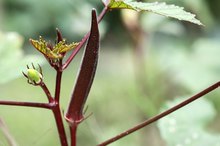What Are the Benefits of Marshmallow Root & the Slippery Elm Herb?
Herbal remedies, including marshmallow root and slippery elm, offer numerous health benefits. Marshmallow possesses a significant amount of mucilage and thus has been used by herbalists and other healthcare practitioners to help treat inflammation and irritation of mucus membranes. Slippery elm also has many purported health benefits for diarrhea and ulcers, for example. Marshmallow root and slippery elm, though often helpful, should be used only after discussing possible risks and side effects with your doctor.
If you are experiencing serious medical symptoms, seek emergency treatment immediately.
Marshmallow Root Information
Marshmallow is a plant that prefers to grow in wet areas, such as marshes. The marshmallow plant is indigenous to Europe, although it now grows in certain parts of North America. Various parts of the marshmallow plant, including its flowers, leaves and roots, have been used for hundreds of years in herbal preparations to treat a wide range of conditions. The marshmallow plant contains many important nutrients, including amino acids, selenium and several kinds of vitamins.
- Marshmallow is a plant that prefers to grow in wet areas, such as marshes.
- Various parts of the marshmallow plant, including its flowers, leaves and roots, have been used for hundreds of years in herbal preparations to treat a wide range of conditions.
Marshmallow Root Benefits
Nutritional Information for Okra Leaves
Learn More
In his book "Therapeutic Herb Manual," expert herbalist Ed Smith notes that marshmallow root performs many important health actions and is used to treat numerous ailments 3. The herb is soothing to gastrointestinal tissues as well as well as the bronchi and urinary tract tissues. This herbal remedy is used to treat mucus membrane inflammation, dry coughs, sore throat, gastric ulcers and bladder infections. Marshmallow may also treat fluid retention and digestive upset.
- In his book "Therapeutic Herb Manual," expert herbalist Ed Smith notes that marshmallow root performs many important health actions and is used to treat numerous ailments 3.
- Marshmallow may also treat fluid retention and digestive upset.
Slippery Elm Information
Slippery elm is an herbal remedy that has long been used by Native Americans to treat many health conditions. The bark -- the inner bark, specifically -- of the slippery elm tree is used medicinally and possesses deep fissures, a gummy consistency and a distinct odor. Slippery elm bark contains many active plant chemicals, including campesterol, mucilage and beta-carotene. Slippery elm bark also contains zinc, calcium, iron and magnesium.
- Slippery elm is an herbal remedy that has long been used by Native Americans to treat many health conditions.
- Slippery elm bark contains many active plant chemicals, including campesterol, mucilage and beta-carotene.
Slippery Elm Benefits
Benefits of Marshmallow Root Tea
Learn More
According to nutrition researcher Phyllis Balch, author of "Prescription for Nutritional Healing," slippery elm is particularly effective for soothing irritated mucus membranes throughout your digestive system 5. Slippery elm is also beneficial for treating gastric ulcers, inflammatory bowel conditions, diverticulitis and diarrhea. Slippery elm is prescribed by herbalists and other healthcare practitioners to reduce fever, sore throat and inflammation in various parts of your body. This herb should not be used for bronchitis or cancer without first talking with your doctor.
- According to nutrition researcher Phyllis Balch, author of "Prescription for Nutritional Healing," slippery elm is particularly effective for soothing irritated mucus membranes throughout your digestive system 5.
- Slippery elm is prescribed by herbalists and other healthcare practitioners to reduce fever, sore throat and inflammation in various parts of your body.
Related Articles
References
- University of Michigan Health System: Marshmallow
- Memorial Sloan-Kettering Cancer Center: Slippery Elm
- "Therapeutic Herb Manual"; Ed Smith; 2007
- University of Maryland Medical Center: Slippery Elm
- "Prescription for Nutritional Healing"; Phyllis A. Balch, CNC; 2010
- MedlinePlus. Slippery Elm. Updated November 5, 2017.
- Hawrelak, J. and Myer, S. Effects of two natural medicine formulations on irritable bowel syndrome symptoms: a pilot study. J Altern Complement Med. 2010 Oct;16(10):1065-71. DOI: 10.1089/acm.2009.0090.
- Langmead, L.; Dawson, C.; Hawkins, C. et al. Antioxidant effects of herbal therapies used by patients with inflammatory bowel disease: an in vitro study. Aliment Pharmacol Therapeu. 2002;16(2):197-205.
- Tinsley, G.; Urbina, S.; Santos, E. et al. A Purported Detoxification Supplement Does Not Improve Body Composition, Waist Circumference, Blood Markers, or Gastrointestinal Symptoms in Healthy Adult Females. J Diet Suppl. 2018 Jun 29:1-10. DOI: 10.1080/19390211.2018.1472713.
Writer Bio
Robyn Hughes has been writing since 2008 about health, nutrition, fitness and botanical medicine. She is a naturopathic physician and freelance writer based in Durham, N.C. She holds a Bachelor of Arts in cognitive science from Indiana University and a doctoral degree from the National College of Natural Medicine in Portland, Ore.









